
Exploring Central - "Sad News From Central Mine"
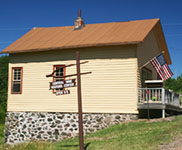
The Central Mine Visitor's Center.
ANNOUNCEMENTS --
This is a test web site designed only to be seen by KCHS Board members. It is based on the existing KCHS web site, uses the much of the same content as the existing site but has major technical and design changes and additional content. Take the link below to the announcements page for all the details.
All of the KCHS Museums are closed for the 2013 season. We will post the 2014 schedule of activities in the spring.
Check the Sites and Museum Schedule page for hours and locations for all 11 KCHS museums for the past 2013 season.
Use this menue to explore some of the history of Central and Central Mine
Sad News From Central Mine
As was the case in many early copper mines, the miners at Central were lowered down to the mine in the same type of rail car that was used to raise the rock from the mine. This car, commonly called a skip, was raised by means of a wire-rope that was attached to the skip at one end and to a large hoisting engine at the other end. The hoist engineer operated the hoist engine that raised and lowered the skip. On Monday, April 22, 1872, the wire rope at Central snapped as men were being lowered into the mine. Most of the thirteen men who were riding the skip were Cornish. This poem, "Sad News from Central Mine" appeared in the newspapers in Cornwall some time after the accident. While it was a poetic way of announcing and commemorating those who died it also provides a glimpse of the hard life these Cornish miners faced as they toiled in the "foreign land" we now call Central.
Sad news from across the ocean we hear,
Sad news from the Central Mine,
Sad news for the wives and children dear,
Of death in that distant clime.
'Twas ten o'clock on an April night,
When a change of men took place,
And thirteen miners in the skip— "all right;"
Down the shaft were lowered apace.
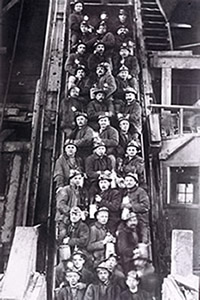
This photograph shows a man car used in the Quincy
Mine during the 1920's. The 'skip' mentioned in the
poem would have been a car with larger sides that
normally would have carried copper ore to the surface
but was also used during that time period to lower
men to the mine workings underground.
Ten men were on the top of the skip
And three seem'd sage within,
When the wire-rope broke with a sudden snap,
And it fell with an awful din.
Two of the men fell in the level below,
In the ten-fathom level 'tis said;
Joel Eade had his arms and legs broken like tow,
Thomas Bone was killed stone dead.
The cries of poor Bade were dreadful to hear
As up from the shaft they came,
Which fili'd the hearts of the miners with fear,
As they stood and heard the same.
The guides from the skip fell off with a crash,
To the fifty-fathom they fell,
And across the shaft they fix'd with a smash
'Twas to several a funeral knell.
The three in the skip alive remain'd,
Though frighten'd and much alarm'd.—
In that position awhile sustain'd,
Not a hair on their head was harm'd.
Eight others were kili'd in that dread place,
Midst broken timber and stones,
With limbs all smash'd and disfigur'd face,
Torn-off flesh and splinter'd bones.
When the engineer found the rope was broke,
The whistle he sounded aloud,
To summon some help to the fearful spot,
Where soon assembled a crowd.
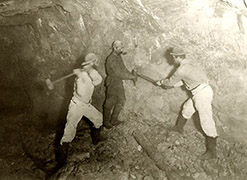
This classic photo shows two miners "Double Jacking"
to drill a
hole by candlelight. Many of the miners at
Central were of
Cornish descent and
thus were
often called "Cousin Jacks." While none of these
photographs
were taken inside of the Central mine
they are representative of the
mining done during
the time of the tragedy at Central. (MTUCCHC).
Some quickly descended the fatal shaft,
A horrible scene to behold;
Eight of their comrades of life bereft,
Their bodies all bloody and cold.
They might have gone down much deeper still
Full eighty fathom or more;
For the shaft was a hundred and twenty deep,
Where they sought for the precious ore.
And one by one they were soon brought up,
And laid in the change-house near,
'Till coffins were made in which they were put,
And sorrow and sighing were there.
To their homes they bore them in sad array,
For awhile with friends to remain,
And then to the grave on the first of May,
There proceeded a mournful train.
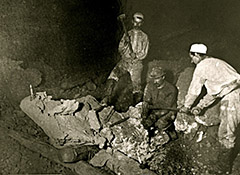
Two of these miners are each swinging an 8
pound sledge hammer while the third is holding
a chisel as they attempt to cut a large mass of
copper. As can be seen on the left
of the photo,
all of their work would have been done
by
candlelight. (KNHP)
On the fourth of May, poor Joel Bade,
Of his terrible winds did die;
And soon with his comrades side by side,
In that foreign grave did lie.
The names of the dead we must here record,
All bred in English homes,
With wives and children depending for bread,
Who now their sad fate bemoan.
From Bovey Tracy, in Devonshire,
There two of the victims came, —
Philip Roberts who's left a family dear,
Thomas Champion a young man's name.
Joel Eade from Ludgvan; from Zennor three
Who first-cousins were well known—
Thomas Berriman and John—two brothers they,
And also Thomas Bone.
From Callington was Jacob Grey; —
And William Barritt too;
John Ivey from Camborne came thy say,
Edward Thomas from Marketjew. *
The names of those who were sav'd in the skip
All three from Cornwall came.
And one of them was a Gwinear chap,
And Edward Trezise was his name.
John Pearce from Crowan known full well,
John Rowe from Camborne town.
And these were spar'd alive to tell
Of their comrades stricken down.
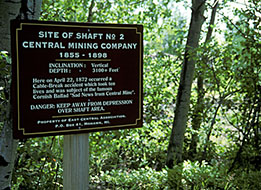
This sign was erected to mark the spot where the tragedy
occured that sparked the poem, "Sad News from
Central Mine.
Four families at Lake Superior live,
With husbands and fathers gone;
Without some friends their wants relieve,
How sad in that land alone.
At home there are four more families left,
No husbands of father dear,
By this sad accident of those bereft,
They liv'd with a love sincere.
Though their graves are made in a foreign land,
And their forms no more we shall see,
yet we hope to meet them on Canaan's strand,
Each one with his family.
For when the last trump sounds thro' the skies,
Each one shall appear again,
And may they and us with joy arise,
The Savior to meet. —Amen.
(This poem appears in several sources including "Central Mine: Years of Hard Work, Lives of Pain and Hope." , available from the KCHS via our publications page.)
Return to the top of the page.
